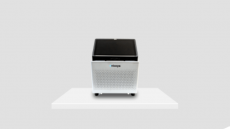Cellevate bags €3.2 million to smash viral vector manufacturing bottleneck

As gene therapies gain momentum, large contract development and manufacturing organizations (CDMOs) have invested billions in expanding their production capacity. However, current manufacturing processes are dogged by low yields and high costs of production, particularly when it comes to producing viral vectors that carry the gene therapy.
To address these challenges, Cellevate’s Cellevat3d technology uses a technique called electrospinning to generate polymer nanofibers. Compared to standard processes, which involve growing cells on microcarrier beads, these fibers mimic collagen and elastin fibers found in human tissues, increasing the surface area on which cells can grow by a factor of up to 60. The fibers and format of the technology can also be customized to the needs of each user, boosting their viral vector yield in a range of scales.
The round, which was led by Industrifonden and the European Innovation Council Fund (EIC Fund), will be used to establish a commercial team in North America in addition to a customer support team. The firm will also scale up its production and implement a marketing program, with customer interest already coming in from CDMOs, biopharma companies and viral vector manufacturing facilities at hospitals, CEO Laura Chirica told BioPharma-Reporter.
Welcoming Cellevate’s technology, Uwe Gottschalk, operating partner at Keensight Capital and chairman of Cellevate’s board, stated that the “timing for bringing such cutting-edge solutions for biomanufacturing could not be better as gene therapy needs improved productivity and process economy.”
Cellevate was spun out from the nanoscience research center NanoLund in 2014 and received €2.48 million from the EIC Accelerator in 2022, followed by a €3.4 million in its first seed round in late 2023.
Gene therapies have traditionally been used only in rare genetic diseases, with recent approvals by the US Food and Drug Administration including Vertex Pharmaceuticals’ Casgevy and Bluebird Bio’s Lyfgenia, both for the treatment of sickle cell disease in patients 12 years and older. This means that the demand for viral vectors until recently has been limited to hundreds to thousands of doses across development and commercialization. However, huge demand for viral vector-based vaccines during the Covid-19 pandemic saw viral vector manufacturing needing to scale up to millions of doses.
The global market for viral vector manufacturing is set to grow by 11.4% per year from $703.7 million this year to $2.3 billion by 2035, with the growth fueled by increasing demand and projects to improve yields. The upstream bioprocessing market in particular is dominated by large companies such as Cytiva, Sartorius, Thermo-Fisher, Merck and Corning, Chirica said.
Other startups gunning to streamline the manufacturing process of cell and gene therapies include the UK robotics specialist Ori Biotech, which bagged over $100 million in a B round in 2022, and the US firm Cellares, whose $255 million Series C round last year is financing the launch of its so-called smart factory for cell therapies.


















